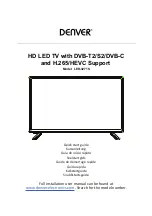
No.51843
C-T1421
7
AUDIO
AV1 IN
VIDEO
Converter/Descrambler
A
B
Converter/Descrambler
A/B Switch
Splitter
This television has an extended
tuning range and can tune most
cable channels without using a
cable company supplied
converter box. Some cable
companies offer "premium pay
channels" in which the signal is
scrambled. Descrambling these
signals for normal viewing
requires the use of a descrambler
device which is generally
provided by the cable company.
ANTENNA/CATV CONNECTIONS
Separate VHF/UHF Antennas
Connect the 75 ohm Cable from the VHF antenna and the UHF
antenna Twin-lead to a combiner (not supplied). Attach the
Combiner to the Antenna Jack.
NOTE:If your VHF antenna has a Twin-lead Wire, use the 300-
75 ohm Matching Transformer, then connect the Transformer to
the Combiner.
For Subscribers to Basic Cable TV Service
For basic cable service not requiring a Converter/Descrambler
box, connect the CATV 75 ohm Coaxial Cable directly to the
Antenna Jack on the back of the television.
For Subscribers to Scrambled Cable TV Service
If you subscribe to a cable service which requires the use of a
Converter/Descrambler box, connect the incoming cable to the
Converter/Descrambler box and connect the output of the box
to the Antenna Jack on the back of the television. Follow the
connections shown left. Set the television to the output of the
Converter/Descrambler box (usually channel 3 or 4) and use
the Converter/Descrambler box to select channels.
For Subscribers to Unscrambled Basic Cable with
Scrambled Premium Channels
If you subscribe to a cable service in which basic cable
channels are unscrambled and premium channels require the
use of a Converter/Descrambler box, you may wish to use a
two-set signal splitter (sometimes called a "two-set coupler")
and an A/B Switch box from the cable installer or an electronics
supply store. Follow the connections shown left. With the switch
in the "B" position, you can directly tune any nonscrambled
channels on your TV. With the switch in the "A" position, tune
your TV to the output of the Converter/Descrambler box (usually
channel 3 or 4) and use the box to tune scrambled channels.
Combination VHF/UHF Antenna (Single 75 ohm
Cable or 300 ohm Twin-lead Wire)
Connect the 75 ohm cable from a combination VHF/UHF
antenna to the Antenna Jack. If your combination antenna has
a 300 ohm Twin-lead Wire, use the 300-75 ohm Matching
Transformer.
Combination VHF/UHF Antenna (Separate VHF and
UHF 300 ohm Twin-leads)
Connect the UHF Twin-lead Wire to a Combiner (not supplied).
Connect the VHF Twin-lead to the 300-75 ohm Matching
Transformer. Attach the Transformer to the Combiner. Attach the
Combiner to the Antenna Jack.
300-75 ohm
Matching Transformer
Combiner
(not supplied)
300-75 ohm
Matching Transformer
VHF Antenna
Incoming CATV
Single 75 ohm Cable
Combination VHF/UHF Antenna
300 ohm Twin-lead Wire
Splitter
Take off the Splitter
Single 75 ohm Cable
300 ohm Twin-lead Wire
300 ohm Twin-lead Wire
UHF Antenna
Indoor Antenna
A single pole antenna is supplied with the unit (C-T1421 only),
insert the antenna holder into the mounting hole on the back of
the cabinet until it locks into place. Attach the antenna plug to
the antenna jack. Adjust the length and angle of the antenna
rod to receive the best possible picture.
6
REMOTE CONTROL
(CONTINUED)
BATTERY INSTALLATION
2. Install two “AAA” (penlight size) batteries, paying
attention to the polarity diagram in the battery
compartment.
1. Open the battery compartment cover in the direction
of the arrow.
3. Replace the compartment cover.
BATTERY PRECAUTIONS
The precautions below should be followed when using
batteries in this device:
1. Use only the size and type of batteries specified.
2. Be sure to follow the correct polarity when installing the
batteries as indicated in the battery compartment.
Reversed batteries may cause damage to the device.
To avoid a potential short circuit, insert the “–” end first.
3. Do not mix different types of batteries together (e.g.
Alkaline and Carbon-zinc) or old batteries with fresh
ones.
4. If the device is not to be used for a long period of time,
remove the batteries to prevent damage or injury from
possible battery leakage.
5. Do not try to recharge batteries not intended to be
recharged; they can overheat and rupture. (Follow
battery manufacturer’s directions.)
EFFECTIVE DISTANCE OF THE REMOTE CONTROL TRANSMITTER
15 FEET
30˚
30˚
NOTES: • When there is an obstacle between the TV and the transmitter, the transmitter may not operate.
• When direct sunlight, an incandescent lamp, fluorescent lamp or any other strong light shines on the
Remote sensor of the TV, the remote operation may be unstable.


























